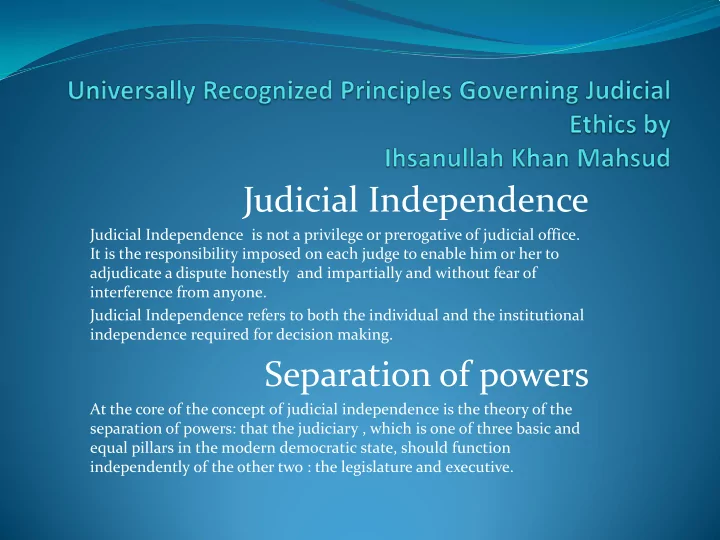

Judicial Independence Judicial Independence is not a privilege or prerogative of judicial office. It is the responsibility imposed on each judge to enable him or her to adjudicate a dispute honestly and impartially and without fear of interference from anyone. Judicial Independence refers to both the individual and the institutional independence required for decision making. Separation of powers At the core of the concept of judicial independence is the theory of the separation of powers: that the judiciary , which is one of three basic and equal pillars in the modern democratic state, should function independently of the other two : the legislature and executive.
Cont.. Perception of Independence It is important that the judiciary should be perceived as independent, and that the test for the independence should include that perception. High standard of judicial conduct Public acceptance of , and support for , court decision depends upon public confidence in the integrity and independence of the judge. Independent of other influences Any attempt to influence a court must only be made publically in a court room by litigants or their advocates Independent of colleagues
IMPARTIALITY Fundamental quality required of judge Impartiality is the fundamental quality required of a judge . Impartiality must exist both as matter of fact and as a matter of reasonable perception. Impartiality is either subjective (free of any bias) or personal. Conduct in court ( un-biased) Bias may manifest either verbally or physically (by word uttered or body language / physical demeanor ) Ex parte communications There should be no communication concerning a case between the judge and any of the parties in absence of the other party. Conduct outside court Conflict of interest Personal interest must not conflict with the judge’s duty to adjudicate impartially.
INTEGRITY Irreproachable conduct required Confidence in the judiciary is founded not only on the competence and diligence of its members but also on their integrity and moral uprightness Applicable to both public and private life Integrity in court Because appearance is as important as reality therefore a judge must not only be honest but should also appear to be so.
PROPRIETY Proper conduct in public in private Restricted life-style Relations with lawyers Relation with litigants Improper use of the prestige of judicial office
EQUALITY Responsive to diversity in society Court users must be treated with dignity Judicial remarks must be tempered with caution and courtesy
COMPETENCE AND DILIGENCE Primary obligation of the judge is the due performance of the judicial functions ( Interpretation and application of law). Obligation to undergo judicial training Relevance of international human rights law Duty to of dispose of matters with reasonable promptness Importance of transparency
Cont.. Duty to maintain order and decorum in court Patience,diginity and courtesy are essential attributes of a judge Fair and equitable distribution of work
Recommend
More recommend